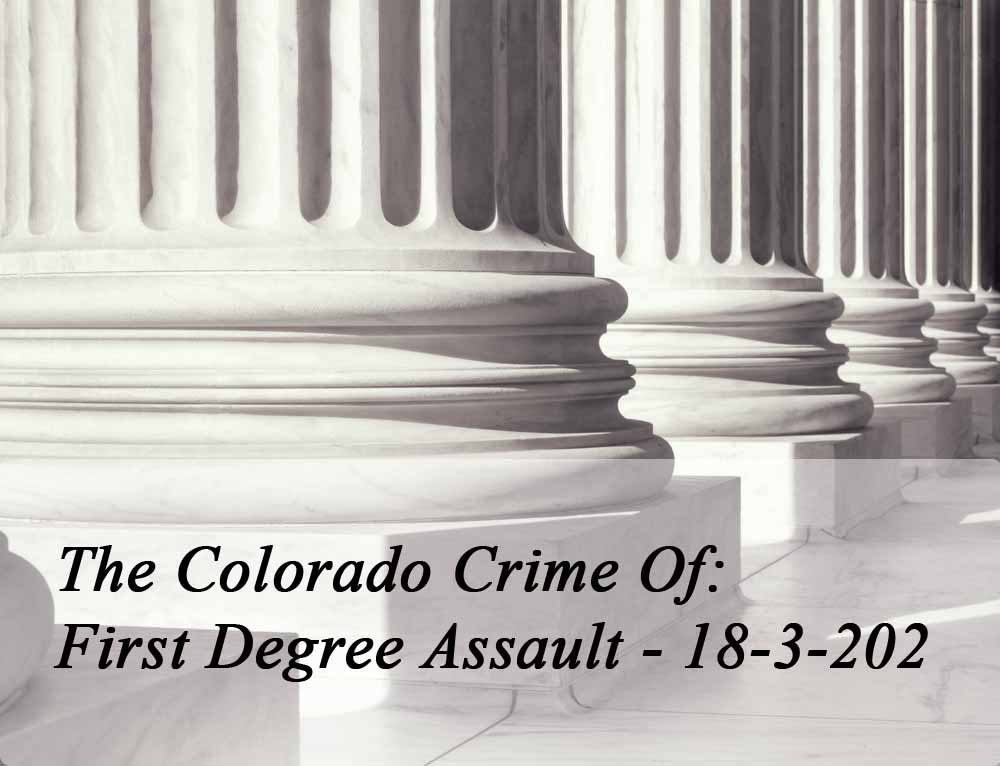The Colorado Crime Of First Degree Assault – 18-3-202
 To understand the Colorado Criminal Code and more specifically the charge or charges in the Complaint and Information or Grand Jury Indictment against you – you need TWO things.
To understand the Colorado Criminal Code and more specifically the charge or charges in the Complaint and Information or Grand Jury Indictment against you – you need TWO things.
I. You Will Need To Understand The Actual Crime With Which You Have Been Charged
– The statute as of 2016 appears first on this page.
II. You Will Need To Understand How The Jury Or Judge Reads The Elements – (the necessary parts or list of things that make up the crime)
– The Jury Instructions for most of the main forms of the crimes with which individuals are charged – appears on the second half of the page.
18-3-202. Assault in the first degree.
(1) A person commits the crime of assault in the first degree if:
(a) With intent to cause serious bodily injury to another person, he causes serious bodily injury
to any person by means of a deadly weapon; or
(b) With intent to disfigure another person seriously and permanently, or to destroy, amputate, or
disable permanently a member or organ of his body, he causes such an injury to any person; or
(c) Under circumstances manifesting extreme indifference to the value of human life, he knowingly
engages in conduct which creates a grave risk of death to another person, and thereby causes
serious bodily injury to any person; or
(e) With intent to cause serious bodily injury upon the person of a peace officer, firefighter, or
emergency medical service provider, he or she threatens with a deadly weapon a peace officer,
firefighter, or emergency medical service provider engaged in the performance of his or her duties,
and the offender knows or reasonably should know that the victim is a peace officer, firefighter,
or emergency medical service provider acting in the performance of his or her duties; or
(e.5) With intent to cause serious bodily injury upon the person of a judge of a court of competent
jurisdiction or an officer of said court, he threatens with a deadly weapon a judge of a court of
competent jurisdiction or an officer of said court, and the offender knows or reasonably should know
that the victim is a judge of a court of competent jurisdiction or an officer of said court; or
(f) While lawfully confined or in custody as a result of being charged with or convicted
of a crime or as a result of being charged as a delinquent child or adjudicated as a delinquent
child and with intent to cause serious bodily injury to a person employed by or under contract with
a detention facility, as defined in section 18-8-203 (3), or to a person employed by the division
in the department of human services responsible for youth services and who is a youth services
counselor or is in the youth services worker classification series, he or she threatens with a
deadly weapon such a person engaged in the performance of his or her duties and the offender knows
or reasonably should know that the victim is such a person engaged in the performance of his or her
duties while employed by or under contract with a detention facility or while employed by the
division in the department of human services responsible for youth services. A sentence imposed
pursuant to this paragraph (f) shall be served in the department of corrections and shall run
consecutively with any sentences being served by the offender. A person who participates in a work
release program, a furlough, or any other similar authorized supervised or unsupervised absence
from a detention facility, as defined in section 18-8-203 (3), and who is required to report back
to the detention facility at a specified time shall be deemed to be in custody.
(2) (a) If assault in the first degree is committed under circumstances where the act causing the
injury is performed upon a sudden heat of passion, caused by a serious and highly provoking act of
the intended victim, affecting the person causing the injury sufficiently to excite an irresistible
passion in a reasonable person, and without an interval between the provocation and the injury
sufficient for the voice of reason and humanity to be heard, it is a class 5 felony.
(b) If assault in the first degree is committed without the circumstances provided in paragraph (a)
of this subsection (2), it is a class 3 felony.
(c) If a defendant is convicted of assault in the first degree pursuant to subsection (1) of this
section, the court shall sentence the defendant in accordance with the provisions of section
18-1.3-406.
(3) (a) The court shall order any adult or juvenile who is bound over for trial for an offense
described in subsection (1) of this section subsequent to a preliminary hearing or after having
waived the right to a preliminary hearing, or any person who is indicted for or is convicted of any
such offense, to submit to a medical test for communicable diseases and to supply blood, feces,
urine, saliva, or other bodily fluid required for the test if the person’s blood, seminal fluid,
urine, feces, saliva, mucus, or vomit came into contact with any victim of the assault, peace
officer, firefighter, emergency medical care provider, or emergency medical service provider.
Within ten days after receipt of the medical test results, the defendant shall report the results
to the court or the court’s designee, who shall then disclose the results to any victim, peace
officer, firefighter, emergency medical care provider, or emergency medical service provider who
came into contact with the substance and requests such disclosure. Review and disclosure of medical
test results by the court must be closed and confidential, and any transaction records relating
thereto are also closed and confidential. If a person subject to a medical test for communicable
diseases pursuant to this paragraph (a) voluntarily submits to a medical test for communicable
diseases, the fact of such person’s voluntary submission is admissible in mitigation of sentence
if the person is convicted of the charged offense.
(b) In addition to any other penalty provided by law, the court may order any person who is convicted of the offense described in subsection (1) of this section to meet all or any portion of the financial obligations of medical tests performed on and treatment prescribed for the victim, peace officer, firefighter, emergency medical care provider, or emergency medical service provider.
(c) Any person who receives the results of a medical test pursuant to this section shall not
publicly disclose the results.
The Most Commonly Charged Versions Of First Degree Assault
ASSAULT IN THE FIRST DEGREE (DEADLY WEAPON)
The elements of the crime of assault in the first degree (deadly weapon) are:
1. That the defendant,
2. in the State of Colorado, at or about the date and place charged,
3. with intent,
4. to cause serious bodily injury to another person,
5. caused serious bodily injury to any person,
6. by means of a deadly weapon.
[7. and that the defendant’s conduct was not legally authorized by the affirmative defense[s] inInstruction[s] .]
ASSAULT IN THE FIRST DEGREE (PERMANENT DISFIGUREMENT)
The elements of the crime of assault in the first degree (permanent disfigurement) are:
1. That the defendant,
2. in the State of Colorado, at or about the date and place charged,
3. with intent,
4. to disfigure another person seriously and permanently, or to destroy, amputate, or disable
permanently a member or organ of another person’s body,
5. caused such an injury to any person.
[6. and that the defendant’s conduct was not legally authorized by the affirmative defense[s] inInstruction[s] .]
Defense Based Interrogatories – Jury Instructions
ASSAULT IN THE FIRST DEGREE – INTERROGATORY
(PROVOKED AND SUDDEN HEAT OF PASSION)
If you find the defendant not guilty of assault in the first degree, you should disregard this
instruction and sign the verdict form to indicate your not guilty verdict.
If, however, you find the defendant guilty of assault in the first degree, you should sign the
verdict form to indicate your finding of guilt and answer the following verdict question on the
verdict form:
Was the defendant acting upon a provoked and sudden heat of passion? (Answer “Yes” or “No”)
The defendant was acting upon a provoked and sudden heat of passion only if:
1. the act causing the injury was performed upon a sudden heat of passion,
2. caused by a serious and highly provoking act of the intended victim,
3. affecting the defendant sufficiently to excite an irresistible passion in a reasonable person,
and
4. between the provocation and the assault, there was an insufficient interval of time for the
voice of reason and humanity to be heard.
The prosecution has the burden to prove, beyond a reasonable doubt, that the defendant was not
acting upon a provoked and sudden heat of passion. In order to meet this burden, the prosecution
must disprove, beyond a reasonable doubt, at least one of the above numbered conditions.
